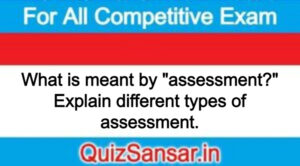
What is meant by “assessment?” Explain different types of assessment.
What is meant by “assessment?” Explain different types of assessment.
Ans.
Assessment
A supplier will come to know the extent of his tax liability which has to be discharged on a Continuous and regular basis only after assessment. There might be situations when these determinants might not be readily ascertainable and may be subject to outcome of a process that requires deliberation and time.
The term “assessment” means determination of tax liability and includes:
1. Self-Assessment,
2. Provisional Assessment,
3. Scrutiny Assessment,
4. Assessment of Non-Filers of Returns,
5. Best judgement Assessment,
6. Assessment of Unregistered Persons.
7. Summary Assessment.
We now discuss various types of assessments in detail hereunder:
1. Self-Assessment (Section 59)
As per Section 59 of the CGST Act, 2017 “A registered taxable person shall undertake self-assessment of the taxes payable and furnish a return for each tax period. Determination of tax liability is to be undertaken by the taxpayer himself and stated in the return to be filed by him.” It may be noted that the assessment as made by the registered person would be treated as final.
2. Provisional Assessment (Section 60)
Provisional Assessment can be invoked by a taxable person by making a request/application to the proper officer, and such request may be made only under the following two circumstances:
(1) He is unable to determine the value of goods and/or services, or
(ii) He is uncertain about the rate of tax applicable.
Provisional Assessment can be made only upon a written request in Form GST ASMT-01 made by the taxable person, and the same cannot be resorted to by the proper officer on suo-moto basis.
Proper officer shall pass an order in Form GST ASMT-04 allowing payment of tax on provisional basis at such rate or on such value as may be specified by him within a period of 90 days from the date of receipt of such request.
For securing the amount of difference between the provisional assessment and tax as may be finally assessed, the proper officer may also require the taxable person to execute a bond, or to furnish a surety or security.
Proper officer shall within a period of six months from the date of communication of provisional assessment, pass the final assessment order in Form GST ASMT-07 after taking into account such information as may be required. However, the time of 6 months can be further extended.
Whether self assessment and provisional assessment are mutually exclusive?
Yes, if the taxable person opts for self assessment, he cannot opt for provisional assessment for the same period and same supply. However, he can opt for provisional assessment for any subsequent periods.
3. Scrutiny for Assessment (Section 61)
The proper officer may scrutinize the return and shall inform the taxable person of discrepancies noticed, if any, and seek his explanation. The purpose of scrutiny is to ensure that all transactions undertaken by the taxable person during the tax period have been disclosed fully and are in conformity with the provisions of the law. Scrutiny of returns is not a legal or judicial proceeding i.e., no order can be passed. If the officer finds the explanation satisfactory then, the taxable person shall be informed and no further action will be taken.
When Explanation is not Satisfactory
In case of any discrepancy found with reference to information available, the proper officer shall issue a notice to the said person informing him of such discrepancy and seeking his explanation thereto not exceeding 15 days from the date of service of the notice, as may be specified in the notice; and also quantifying the amount of tax, interest and any other amount payable in relation to such discrepancy.
The registered person may accept the discrepancy mentioned in the above-stated notice, and pay the tax, interest and any other amount arising from such discrepancy and inform the same or furnish an explanation for the discrepancy to the proper officer.
In case of satisfactory response is not received within 30 days or extended time, the proper officer may undertake, Department Audit, Special Audit, Inspection or Search and Seizure or Determination of Tax. The proper officer may subsequently determine tax, interest and penalty due from the taxable person.
4. Assessment of Non-Filers of Returns (Section 62)
Where a registered person fails to file his return, which may pertain to any of the category, Return for the tax period in case of a normal taxable person, Return in case of a person opting for composition.
Where a registered taxable person fails to file his return within 15 days of issuance of notice, the proper officer may assess the tax liability to the best of his judgement and issue an assessment order within a period of 5 years for the furnishing of the annual return for the financial year.
If a valid return has been furnished within 30 days of service of assessment order, the proper officer may withdraw the said assessment order, but the liability for payment of interest for payment of late fee shall continue.
5. Best Judgement Assessment
.. In the best judgement assessment, an assessing officer assesses the assessee based on his reasoning and using the – information available. The assessment will be made without having any bias. Under GST, Best Judgement Assessment becomes applicable in 2 situations:
(i) When a taxable person has not filed a return,
(ii) When a person has not registered for GST even though he is liable to do so. The expression “best of his judgement” sets the tone of the nature of assessment. The assessing authority must make an assessment, which in his own judgement, is the best one in the given circumstances. The term “judgement” dispels the idea of arbitrary conclusion and indicates that in making the assessment, the assessing authority must apply his mind, must come to a logical conclusion giving an express reasoning leading to the decision.
Assessment of Unregistered Persons (Section 63)
The proper officer may apply best of his judgement for the relevant tax periods and issue an assessment order where, a taxable person fails to obtain registration even though liable to do so, or whose registration has been cancelled, but who was liable to pay tax.
The proper officer shall issue a notice to an unregistered taxable person containing the grounds on which the assessment is proposed to be made on best judgement basis and after allowing a time of 15 days to such person to furnish his reply.
The assessment order must be issued within a period of 5 years from the due date of filing of the annual return for the year to which the tax not paid relates. Thus, that if the transactions of unregistered person pertain for FY 2017-18, then the officer must pass the order till 31.12.2018 + 5 years, i.e., 31.12.2023. No such assessment order shall be passed without giving show cause notice and affording the person a reasonable opportunity of being heard.
7. Summary Assessment
Summary Assessment is generally used in a tax legislation to denote ‘fast track assessment’ based on a return filed by the assessee. The proper officer must have sufficient ground or reason to believe that any delay in assessment will adversely impact the interest of revenue. The proper officer must have evidence in his possession that the person has incurred, or is likely to incur, a liability to pay tax under GST Law.
Where the taxable person to whom the liability pertains is not ascertainable and such liability pertains to supply of goods, the person in charge of such goods shall be deemed to be the taxable person liable to be assessed and liable to pay tax and any other amount due under the law. Order of summary assessment shall be issued where the proper officer has taken prior permission of the Additional/Joint Commissioner.
Order for summary assessment may be withdrawn suo-moto or on application made by the taxable person within 30 days from the date of receipt of the order by Additional/Joint Commissioner if they consider that such order is erroneous.






